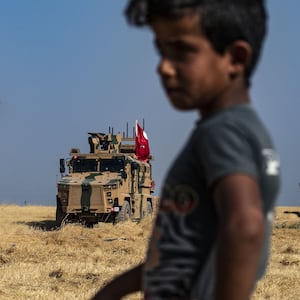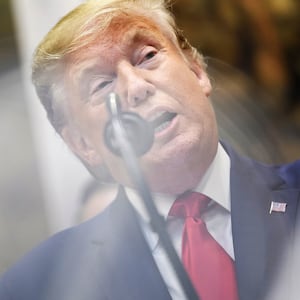The first time Porter Goodman went to Iraq was in 2006 as a mechanic in the U.S. Army.
He was a private citizen when he returned a decade later to use his first-aid training to serve as a volunteer combat medic with the Kurdish militia.
He emphasizes that he went back not just to battle the evil that is ISIS.
ADVERTISEMENT
“I didn’t need to fight something,” he said.
His primary purpose was to support the Kurds in their effort to create what he considers to be a democracy such as any American—from liberals to conservatives such as himself—should applaud.
“A self-built democracy in the Middle East,” the 31-year-old told the Daily Beast this week. “It is everything we hoped for in Afghanistan and Iraq.”
He added, “Iraq cost a lot of money and it cost a lot of American soldiers’ lives. The outcome was not fabulous.”
And the Kurds, he noted, do not expect Americans to do their fighting for them.
They actually took the lead again ISIS.
“They have our back,“ Goodman said. “They really do.”
He has seen the Kurds not just preach, but also practice gender equality and religious tolerance. He does not understand why feminists fail to be more vocal in backing the Kurdish military’s unqualified inclusion of women in combat roles, at a grunt command levels.
“Here is an army of women, AK-47s in hand, fighting for human rights,” Goodman said. “And there is not solidarity with them.”
When he flew off from Utah in January 2016, Goodman understood that parents might not view the Kurds a cause worthy of risking his life. So he said he was heading to a new job in Connecticut.
“I know that if I had told my parents and my siblings that they would make a huge effort to prevent me from going,” he would recall.
He told them the truth after he had landed in back in Iraq, this time having deployed himself.
“I really got an earful from every member of the family,” he remembered. “I was on the phone for hours and hours.”
He then arranged to get smuggled across the border into northern Syria.
Initially, he assisted the Kurds as he might have if he had been a Peace Corps volunteer, teaching English and helping to build a radio station. He then decided to put his first-aid training from his Army days to use. He joined a group of other volunteers of various political persuasions who were training Kurds in such basics as applying tourniquets and connecting IV lines.
When the Kurds prepared to drive ISIS from the city of Manbij, Goodman and several of his fellow volunteers put their knowledge to direct use. They set up a casualty control point just inside the frontline, at a chicken farm they shared with a detachment of U.S. Special Forces operators who were providing military support. Goodman understood the S.F. operators were a whole other kind of soldier than he had been.
“I was a mechanic. I’m not like a hard-core guy,” Goodman told The Daily Beast.
The S.F. operators were all the more special because they did not try to impress anybody,
“They were pretty humble,” Goodman said. “Just really cool, solid people.”
He figured that the operators had undertaken an unspoken added mission concerning him and the other volunteers during the time they were at the farm.
“Keep an eye on us, make sure we were safe,” Goodman said.
He was reminded of what they were fighting against as well as what they were fighting for when terrorized civilians escaped from ISIS territory.
“They would break down crying,” Goodman said.
As the Kurds battled their way into the city, there was an increasingly urgent need for Goodman and other medics to attend to casualties in the middle of the action rather than wait for somebody to get the wounded to the control point.
“It was really intense fighting,” Goodman later said.
Goodman encountered a 23-year-old fellow Amercian named Levi Shirley who had been rejected by the U.S. Marine Corps due to poor eyesight and was now a combat volunteer with the Kurds. Another volunteer had managed to trade some ISIS flags to the American S.F. operators for a case of MRE rations.
“Stale bread and imitation tuna fish,” Goodman recalled.
That can seem a delicacy in a war zone. Shirley suggested there might be more tradable souvenirs in a house that he said his unit had earlier cleared of hazards such as ISIS fighters and booby traps.
“He said, ‘I think I saw something they might want in the house,” Goodman recalled. “I said, ‘I’ll go with you.’”
Goodman does not remember what transpired after they entered. An improvised explosive device killed Shirley. Goodman survived.
“A lot of minor shrapnel wounds, I mean a lot of them,” Goodman later said. “I was really lucky. I was conscious but I don’t remember it.”
The S.F. operators decided Goodman might have suffered traumatic brain injury and arranged for him to be evacuated from the combat zone. He was later billed for the $3,200 airplane ticket for his flight back to the states.
He returned home in the summer of 2016, having risked and almost lost his life for what he continued to see as one cause that all of us could support even as the country’s political divisions deepened.
He remained what he describes as a moderate conservative.
“The left, they don’t lose an opportunity to criticize Trump for everything,” Goodman said. “A lot of people on the right, it makes it easy to shrug off the criticisms…”
With regard to his own views, he said, “I’m not of the opinion that everything Trump does is stupid and wrong. I was never a Trump supporter but I wasn't a Trump hater either.”
He did remain a Kurd supporter, and stayed in touch with his comrades via the internet as he went to work as a software engineer.
At the start of this week, Goodman saw a sudden flurry of postings and learned of Trump's shocking announcement following a phone conversation with Turkish President Recep Tayyip Erdoğan. The U.S. was withdrawing its military support of the Kurds in advance of an impending Turkish invasion.
“Turkey, they are not going to be nice when they come over the border,” Goodman noted.
Goodman said the only terrorists he saw in Northern Syria were with ISIS. He believes that in putting that label on the present-day Kurds, Erdogan to justify his authoritarianism as a necessary protection against a dire threat.
Goodman reasoned from afar that Trump does not listen to his advisers because he considers them subordinate, but views foreign leaders such as Erdogan as his peers.
“[Trump] doesn’t know how to handle a hard phone call; I think it’s a peer pressure thing,” Goodman suggested.
Goodman described the decision with a single word.
“I would call it evil,” he said.
He was speaking not as some reflexive Trump hater, but as the lover of a worthy cause.
“I wake up to some pretty sad and depressing postings by my Kurdish friends,” he reported.
Others who have spoken out in favor of the Kurds include such Trump supporters as Senate Majority Leader Mitch McConnell, Sen. Lindsey Graham and evangelist Pat Robertson.
Goodman reports that the Kurd supporters have come to include a constituency of particular personal importance.
“I think my family see it as a really good thing,” he told The Daily Beast.
He allowed, “I don’t think they want me going away again.”








